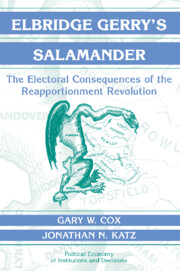2 - The Reapportionment Revolution
Published online by Cambridge University Press: 10 November 2009
Summary
In this chapter, we first describe the basic facts of the reapportionment revolution: the Court's decisions, the malapportionment problem they addressed, and the wave of redistricting action that followed. We then characterize what the literature has said about the last of these three elements – court-ordered redistrictings in the 1960s. Were these redistrictings simply partisan gerrymanders? Were they mostly incumbentprotecting gerrymanders? Were they a bit of both? Were they neither? Finally, we explain why we believe the answers given in the literature need to be reconsidered.
a sketch of the reapportionment revolution
The Court's Decisions
On March 26, 1962, the Supreme Court handed down its decision in the case of Baker v. Carr (369 U.S. 186), thus initiating what has since been known as the reapportionment revolution. The suit was brought by urban plaintiffs in Tennessee, who challenged their state legislature's failure to reapportion despite widespread population shifts that had made urban districts vastly more populous than their rural counterparts. The ramifications of the case were clearly national, because urban and especially suburban Americans were significantly underrepresented in state legislatures throughout the country (Hacker 1964). Thus, although the Court limited itself to declaring that state legislative reapportionment was justiciable, leaving more specific action in the case to the lower courts, its decision was immediately seen as a revolutionary step – one the Court had repeatedly declined to take (most recently in Colegrove v. Green 328 U.S. 529).
The immediate consequence of Baker was more litigation. Indeed, within a year of the decision, all but 14 states were involved in reapportionment suits, and the Supreme Court used some of these cases to stake out a clearer substantive position.
- Type
- Chapter
- Information
- Elbridge Gerry's SalamanderThe Electoral Consequences of the Reapportionment Revolution, pp. 12 - 28Publisher: Cambridge University PressPrint publication year: 2002



